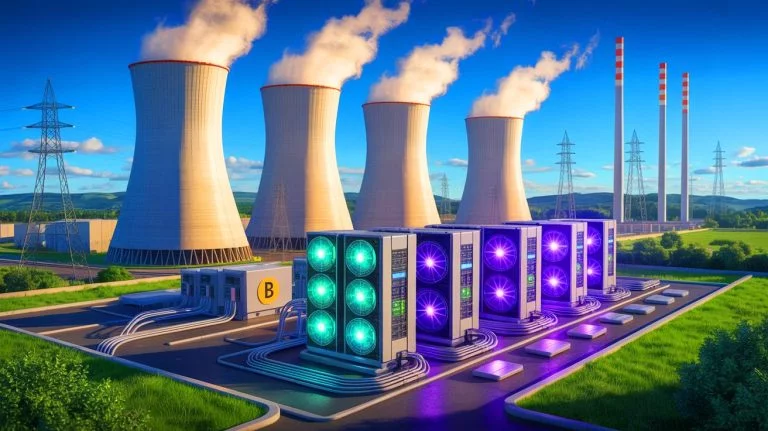| IN A NUTSHELL |
|
France has long been a leader in nuclear energy production, generating more nuclear power than any other country in the European Union. Now, French lawmakers are considering a novel approach to utilize this energy surplus: Bitcoin mining. A proposed bill would allow the state utility, Électricité de France (EDF), to channel excess nuclear power into Bitcoin mining operations. Proponents argue that this could provide a lucrative use for energy that would otherwise be wasted, while critics raise concerns about the environmental impact and the political implications of such a move.
Integrating Nuclear Surplus With Bitcoin Mining
French MP Aurélien Lopez-Liguori, one of the architects of the proposed legislation, believes that harnessing surplus nuclear energy for Bitcoin mining could be both secure and profitable. This plan comes on the heels of a narrower amendment that was rejected in June, which would have required the government to evaluate the role of cryptocurrency mining in France’s energy strategy. Other countries have already taken similar steps. For instance, Pakistan has designated 2,000 megawatts of unused coal-plant capacity for Bitcoin mining and AI data centers. Similarly, Tether has been exploring mining projects powered by surplus renewable energy in South America. These examples illustrate a growing trend of using otherwise wasted energy for digital asset production, potentially offering economic benefits without increasing the overall demand on national power systems.
The French proposal envisions installing mining hardware directly at nuclear sites. This approach could capture value from the two-thirds of heat generated by nuclear fission that currently gets lost before reaching the grid. By using this untapped capacity, France could enhance its position in the digital economy without exacerbating its energy footprint. However, the success of this initiative would depend largely on the collaboration between EDF and the cryptocurrency industry, along with regulatory frameworks that balance innovation with environmental stewardship.
A Political Reversal on Cryptocurrency
The push for this legislation is spearheaded by the right-wing Rassemblement National (RN) party, marking a significant shift from its earlier stance. Party leader Marine Le Pen once called for a ban on cryptocurrencies, citing concerns about the erosion of personal wealth and the empowerment of global banking systems. Despite this previous opposition, RN has emerged as a leading advocate for crypto legislation in France. The party’s embrace of digital currencies has attracted industry supporters who view RN as business-friendly, while left-leaning groups continue to criticize cryptocurrency mining for its environmental impact and potential for facilitating illicit activities.
This political U-turn reflects a broader shift in perception as the French government grapples with the challenges and opportunities presented by cryptocurrencies. While some view digital assets as a threat to traditional financial systems, others see them as a catalyst for economic growth and innovation. The proposed legislation could serve as a litmus test for France’s ability to balance these competing interests as it navigates the complexities of integrating digital currencies into its economic framework.
Evaluating the Environmental and Economic Stakes
Bitcoin mining is notorious for its high energy consumption. Estimates suggest that the network could consume between 138 TWh and 173 TWh annually by 2025, equivalent to the electricity usage of countries like Poland or Argentina. Each Bitcoin transaction currently requires roughly 1,100 to 1,335 kWh, which is comparable to the monthly energy consumption of an average U.S. household. This energy-intensive process, known as “proof-of-work” mining, involves solving complex cryptographic puzzles, with the first computer to find a solution earning a Bitcoin reward.
Critics argue that this model creates a perpetual demand for electricity, locking in high energy consumption rates. However, advocates believe that pairing Bitcoin mining with low-carbon energy sources, such as nuclear power, could mitigate its environmental impact while utilizing excess capacity. The proposal to integrate mining operations with nuclear plants could offer a sustainable solution, provided that the necessary safeguards are in place to prevent environmental degradation and ensure the responsible use of resources.
Future Prospects for France’s Energy and Cryptocurrency Sectors
As French lawmakers deliberate on the proposed bill, questions remain about the feasibility and desirability of incorporating Bitcoin mining into the nation’s energy strategy. While the initiative could provide a new revenue stream for the nuclear sector, it also highlights the ongoing debate over Bitcoin’s environmental footprint. EDF has yet to publicly comment on the possibility of hosting mining operations within its facilities, leaving the future of the proposal uncertain.
The potential integration of surplus nuclear energy with Bitcoin mining underscores the evolving relationship between traditional energy sectors and emerging digital technologies. As France explores this innovative approach, it must consider the broader implications for its energy policy, economic growth, and environmental sustainability. Will the nation embrace this opportunity to capitalize on its nuclear prowess, or will it pivot toward alternative solutions that prioritize ecological preservation?
As France stands at the crossroads of energy innovation and digital transformation, the outcome of this legislative initiative could set a precedent for other countries grappling with similar challenges. How will France balance the economic benefits of Bitcoin mining with the need to protect its environment and secure its energy future?
Did you like it? 4.5/5 (29)








Wow, using nuclear power for Bitcoin mining? That’s a new one! 🚀
Isn’t nuclear energy supposed to be used for more important things than mining Bitcoin?
Good to see France stepping up in the digital world!
Seems like an interesting idea, but what about the environmental impact? 🌿
Finally, a way to use excess nuclear energy! Thank you, France! 🇫🇷
Bitcoin mining and nuclear power, what could possibly go wrong? 😅
Why not use the excess energy for something more sustainable?
I’m not sure how I feel about this. Isn’t Bitcoin bad for the environment?
Great move by France! Let’s hope other countries follow suit.
This seems like a risky venture. Are there any safety measures in place?